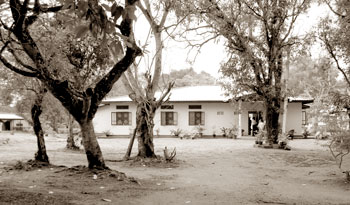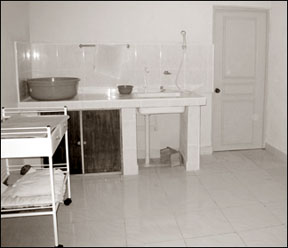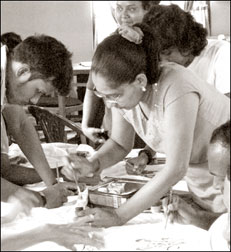Transcending artificial barriers
First in Asia- Mother and Baby Unit at Mental Health
Hospital at Angoda:
 "It's not the large things that send a man to
the madhouse... no, it's the continuing series of small tragedies... not
the death of his love but the shoelace that snaps with no time left." -
Charles Bukowski "It's not the large things that send a man to
the madhouse... no, it's the continuing series of small tragedies... not
the death of his love but the shoelace that snaps with no time left." -
Charles Bukowski
by Rosanne Koelmyer Anderson and Ranga Chandrarathne
Once a condition with grim hope, shun by family and society
,discarded and unknown by the outside world, amidst trauma and their
silent struggle for survival were the inmates of the Mental Hospital,
Angoda but today incredibly mentally uplifted, no longer doomed for
life; a totally changed scenario, an inconceivable experience, a change
for the better by Consultant Psychiatrist, Dr. Jayan Mendis.
Another first in Asia, brainchild of Dr. Mendis is the Mother and
Baby Care Unit at the Angoda Hospital to add to his credibility in the
field of mental health in Sri Lanka.
The unit was set up four months ago as a prerequisite of child
psychology to fulfill bonding between mother and baby as well as
reuniting the disintegrated family, a 4.5 million project funded by a
well-wisher, T.M. Soysa.
The eight bedded Unit is well equipped with eight separate units
comprising two beds, a cot, cupboard and an attached bathroom, an
immaculately hygienic and environmentally friendly unit which houses the
infant, mother and the by stander for a year after childbirth.
|

Baby room |
Priority is given to mothers with metal illnesses after childbirth as
psychiatric illnesses after childbirth is ten times higher than in other
circumstances while pregnant mothers in such conditions are also
accommodated Dr Mendis explained.
Incredibly mentally uplifting the status of the inmates the Unit has
around eight visiting psychiatrists, interview rooms, a baby room and a
specially trained nurses' station which tells the onlooker a story that
"there is so much good in most of us", the commitment to serve the
traumatised is well perceived.
Dr. Mendis explained that the initiative of setting up such a unit
has proved a success as the recovery rate of patients has been
tremendously commendable with the environmental factor playing a
contributory role. We are able to discharge patients sooner as a result
and they return to their normal lifestyles and are reunited with their
families sooner or later.
However, there are more priorities to be ironed out subsequently such
as the necessity to have a community team to visit and monitor the
progress of the patient for at least a year after they return home.
It is interesting to note that over the past decade, there has been
increasing attention towards the identification and management of mood
and anxiety disorders related to childbearing with physicians,
psychiatrists, primary care providers, obstetricians, gynecologists, and
pediatricians, encountering women struggling with mental health issues
during pregnancy, pregnancy loss and after childbirth.
In some cases, the reproductive event itself may precipitate a mental
health crisis while in others, it may exacerbate an underlying mental
health condition that, in turn, may need to be managed differently
because of issues related to pregnancy or breast-feeding.
 "The bottom line message is: 'Mothers who are depressed, go get
treated for your depression. It will help not only you, but your child".
The rate of depression is higher in women than in men, particularly in
women of childbearing ages." "The bottom line message is: 'Mothers who are depressed, go get
treated for your depression. It will help not only you, but your child".
The rate of depression is higher in women than in men, particularly in
women of childbearing ages."
A mother's depression does affect her sibbling," A parent's
depression not only has a strong impact on the family as a whole, but it
often affects a child's functioning. This raises the need for parents to
seek treatment for their depression."
Mental illnesses such as depression and anxiety are brain-based,
biological illnesses. They can be triggered by traumatic experiences or
tragedy and/or by genetic predisposition.
Since the brain is such a complex organ, there are a number of genes
involved in its development and thus a number of generic causes of
mental retardation while 60 per cent are of severe mental retardation.
In order for a genetic condition to be inherited, the disease-causing
gene must be present within one of the parent's genetic code.
Some types of mental illness are genetically transmitted which are
associated with mental retardation, chronic health problems and
developmental delay.
Mental retardation is attributable to any condition that impairs
development of the brain before birth, during birth or in the childhood
years. Two of the most common genetically transmitted forms of mental
retardation include Down syndrome (a chromosomal disorder) and fragile X
syndrome (a single-gene disorder).
When we are physically healthy, emotionally resilient and have
positive family and social relationships, we are in the best position to
be mentally healthy, says Dr Jayan Mendis.
Before the setting up of the Unit, the standard practice with regard
to handling mother who have developed post-pregnancy psychiatric
disorders was to separate the baby from the mother and to send the baby
to the Lady Ridgeway Children's hospital, allowing the mother to visit
the child from time to time.
The father was sent home, putting a full stop to the otherwise
longstanding marriage, unfortunately, with the child birth.
The hapless situation led to the exploitation by people seeking
babies for adoption. There were instances where sick mother's consent
was obtained for such unscrupulous adoptions.
It was pathetic scene that sick mothers wetted their cloths with milk
as they had no way of feeding their children who had been separated and
were under the care of Lady Ridgeway hospital.
The idea of the Mother Baby Unit was not only set up to keep the
mother and baby together but also to help unite the family. This was
made possible by T.M. Soyza, a prospective philonthropist who donated
4.5 million for the eight- bedded construction of this fully-fledged
Unit.
Another important aspect of the unite is that it will dramatically
improve the care provided to the mother who are suffering from
post-pregnancy psychiatric disorders as managing of these patients will
be different from ordinary patients.
Unit has facilities for each family to stay in a homely environment
which betrayed no sense of being admitted in a hospital. The process has
speeded up recovery rate while cementing the natural bond between mother
and child and also the unity of the family.
Currently the Unit boasts of a dedicated medical team including five
nurses and a doctor in addition to visiting psychiatrists.
What is needed at the moment to improve the quality of care for
mothers who have developed post-pregnancy disorder is a community team
to look after these mothers up to a period of one year from the child
birth before being handed them over to, for other psychiatric
treatments. For after treatment care and progress evaluation, the
hospital requires a vehicle.
The unit is not only a boost to the excellent care provided by the
hospital but also adds another dimension to Sri Lankan system of
hospitals and perhaps for the first time in Asia.
[email protected]
|
